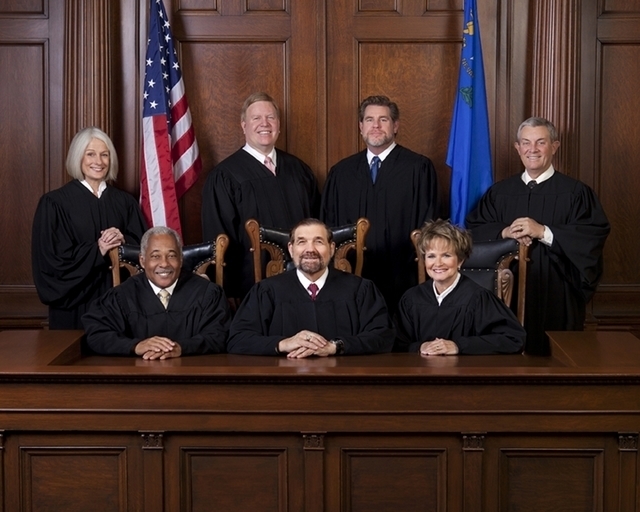Judicial advice: Be clear, be specific and write it all down!
NEWPORT BEACH, Calif. — Members of the State Bar of Nevada — usually a loquacious lot — were uncharacteristically subdued Thursday when given the chance to ask Nevada Supreme Court justices questions about a string of recent high-profile rulings in cases both controversial and seemingly banal.
Five of the court’s seven justices assembled here for what was dubbed a “big case review,” highlighting some of the work the court had completed in recent months. But it was what justices said about how they reach their rulings — and advice to lawyers and lawmakers alike — that was the most intriguing part of the session, part of the State Bar’s annual meeting.
Justice Michael Douglas, for example, reminded lawyers to ensure that sidebar conversations with judges are recorded and preserved for the record, since justices of the high court make their decisions based on written transcripts. A potentially enlightening discussion with a judge that’s not preserved by the court reporter won’t help when a case is under review months or years later, Douglas noted.
Justice James Hardesty gave some insights into how justices interact with each other in conferences to discuss cases. The Nevada court, unlike, say, its brethren on the federal bench, often issues unanimous decisions. And when that’s not possible, justices still try to be civil to each other.
“I think all of us have attempted to be more respectful of each other in our dissents,” he said.
But sometimes, dissents are avoided when the authors of the majority opinion incorporate ideas from skeptical colleagues in what later turn out to be unanimous rulings, Hardesty said. Even when justices do dissent, they may accept suggestions from the majority about their wording.
Douglas said justices are often frustrated when searching legislative transcripts, trying to determine the intent of the Legislature in passing a bill, especially one that changes course on a significant matter of public policy. Often, he said, lawmakers leave no “bread crumbs” for justices to follow to determine why a particular change was made, leaving them to guess as they struggle to interpret the law.
His advice to lobbyists: Make it explicitly clear on the record why a particular change is needed, so when judges later examine they record, they know at least what the Legislature was trying to accomplish.
That’s especially true when the Legislature intends a statute to operate retroactively, said Justice Michael Cherry. If that’s the case, that fact must be clearly stated in the record. (A recent case found litigants arguing over whether a law should apply retroactively, but without enough evidence that’s what the Legislature intended.) “We could only take what we had before us,” he said.
Justice Nancy Saitta agreed, reminding the assembled lawyers that if a statute is subject to two or more reasonable interpretations, justices must ultimately decide which should prevail. She urged lawmakers to always put their intentions on the record, so the court can refer to that information when interpreting laws.
And Douglas reminded lawyers who prevail in District Court — and are given the privilege of writing an order for the judge to sign — to include the legal basis for the ruling in that document. “When a judge rules in your favor, you’re supposed to get our back by writing a good order,” he said.
Hardesty and Cherry also urged members of the Bar to do their part in helping to pass Question 1, a proposal to create an intermediate court of appeals in Nevada. One of the benefits of such a court is more published opinions for District Court judges to apply, especially in matters of pre-trial discovery.
“If we don’t do something about the costs of discovery, we’re just going to run ourselves right out of business,” he said. Otherwise meritorious cases won’t go to trial because clients simply won’t have the money to pay the costs of discovery, he said.
The State Bar’s meeting continues Friday with a presentation by noted constitutional lawyer Erwin Chemerinsky on privacy and the U.S. Supreme Court, as well as seminars on Wikileaks, financial fraud, patent trolls and super-priority liens in homeowners associations. Stay tuned to SlashPolitics for updates!














